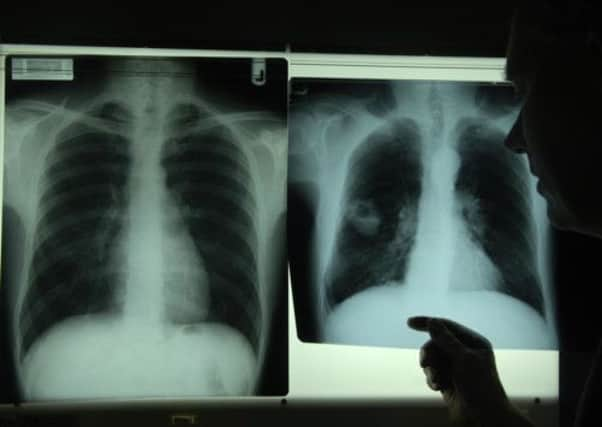Cancer as survival rates forecast to soar


Survival rates are forecast to improve significantly over the next seven years due to early detection and greater awareness through high-profile campaigns.
Just over a third, 36 per cent, of breast cancer patients will ultimately die from their disease, down from 61 per cent in 1992.
Advertisement
Hide AdAdvertisement
Hide AdSome 36 per cent of prostate cancer patients will die, according to projections for 2020 – down from 72 per cent in 1992.
And 39 per cent, of people with bowel cancer will die from their disease, down from 67 per cent in 1992.
The Macmillan Cancer Support data, however, shows lung cancer is lagging significantly, with 76 per cent of patients expected to die, compared with 91 per cent in 1992.
Survival from lung cancer has been historically low, with experts suggesting a range of reasons, including people going to their GP too late and unequal access to surgery depending on where people live.
Previous Macmillan research estimated that by 2020 almost half, 47 per cent, of people would get cancer in their lifetime and 38 per cent would survive the disease.
Professor Jane Maher, chief medical officer of Macmillan, said: “People diagnosed with three of the four most common cancers are more likely to survive but GPs need more support to help them diagnose lung cancer earlier.”
Ciaran Devane, chief executive of Macmillan, said: “Lung cancer patients deserve better. It is high time we closed the gap between survival rates for different cancers and give everyone the best possible chance of recovery.
“There are three key things that could help to achieve this.
Advertisement
Hide AdAdvertisement
Hide Ad“Firstly, we support the call for plain packaging of cigarettes to stop people taking up smoking; secondly we must catch the illness earlier through better awareness; and we have to make sure access to surgery is more uniform across the country to reduce inequalities in survival.”
Katherine Woods, research information manager at Breast Cancer Campaign, said: “We know deaths from breast cancer are decreasing, and are on track to continue to do so. But it is not quick enough. Breast cancer could be completely overcome by 2050. This can only happen if critical research gaps are addressed.”
The warnings followed the publication yesterday of the “Eurocare 5” study of survival rates among cancer patients in Europe between 2000 and 2007.
It found Britain and Ireland were lagging significantly behind countries across the continent and have below-average rates for nine out of ten of the most common cancers.
Five-year survival rates for ovarian cancer were as low as 34 per cent in Scotland and 30 per cent in England, compared with nearly 40 per cent even in poorer parts of eastern Europe.
Scotland was third worst in Europe for stomach cancer with just 16.1 per cent surviving, marginally behind Denmark with 16 per cent and Bulgaria on 11.9 per cent. In comparison, in Iceland 34.5 per cent survived.
Scotland was also third worst in the lung cancer category, with just 8.7 per cent living more than five years. In Wales, 8.6 per cent survived and in Bulgaria 6.2. In Austria, 16.7 per cent lived.
Figures for skin cancer in Scotland were more encouraging with nearly 89 per cent surviving, higher than France, Belgium, and most parts of Scandinavia.
A Scottish Government spokeswoman said: “We expect increased awareness of lung cancer symptoms as a result of our recently launched campaign featuring Sir Alex Ferguson.”